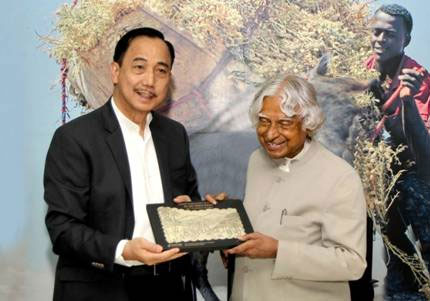Hyderabad, India
June 21, 2013
Renowned scientist and 11th President of India, Dr APJ Abdul Kalam, visited the headquarters of the International Crops Research Institute for the Semi-Arid Tropics (ICRISAT) at Patancheru on 20 June. The purpose of his visit was to inaugurate the newly constructed greenhouse containment facility of the Platform for Translational Research on Transgenic Crops (PTTC).
“In science, everything is possible”, began Dr Kalam, as he addressed the ICRISAT Management, senior scientists, staff members and other invited guests. “In 1885, Lord Kelvin, distinguished British scientist, stated that anything heavier than air cannot be flown. A mere 18 years later, in 1903, the Wright brothers conducted their first flight. Challenges are many. It is up to us to find the solutions”.

Dr APJ Abdul Kalam receiving the ICRISAT Ambassador of Goodwill plaque from Dr William Dar, ICRISAT Director General.
Commenting on the greenhouse containment facility, Dr Kalam continued, “Research breakthroughs in agricultural biotechnology hold the potential for increasing crop productivity and the resistance of food crops to pests and diseases, thereby helping solve the food crisis. The future food demand cannot be met merely from incremental gains through conventional plant breeding. A quantum change in yield improvement is needed.”
Dr Kalam proposed a good list of research missions for ICRISAT, starting with, “For PTTC, the first and foremost task should be development of nutritionally enhanced foods and getting them approved.” He also listed the analysis of barren lands in India to retrieve at least 50% of it in the next 10 years, and the studying of water bodies towards rejuvenating them by 2020.
Dr Kalam recalled that this year marks the 30th anniversary of the first successful introduction of a foreign gene into a plant. “There is clear evidence that the use of GM crops has resulted in significant benefits like higher crop yields, reduced farm costs, increased farm profit and improvement in health and the environment,” he said, “and yet there is a heated debate over GM crops. No illusionary fears can stop the advancement of what is rational and logical. The solution lies in developing beneficial transgenic crops locally. I find today a historical step taken in this direction. The PTTC will be the birthplace of a new generation of transgenic crops.”
Mentioning Dr Dar’s book, Feeding the Forgotten Poor, where Dr Dar drew a map for “second-generation” GM crops, Dr Kalam said that it is not hard to imagine the immense value of these genetically modified crops. “I have no doubt that the developing world stands to benefit from any technology that can increase food production, lower food prices, and improve food quality.” he said.
The PTTC, headed by Dr Kiran Sharma, was established jointly by the Government of India’s Department of Biotechnology and ICRISAT in 2009. This 6.2 million US dollar project was launched to translate transgenic technology and harness its products to meet the needs of agricultural growth, strengthening national, regional and international linkages in transgenic R&D.
Welcoming the former President of India on the occasion, Director General of ICRISAT, Dr William D. Dar said, “Modern technologies, particularly agricultural biotechnology, has the potential to reduce crop losses from pests and diseases, improve the nutrient efficiency of food and animal feeds, extend the post-harvest life of fruits and vegetables, and increase the stress tolerance of crop plants allowing them to thrive even under various environmental extremes.”
Ever focused on uplifting the poor farmers of the semi-arid tropics, he continued, “Scientific solutions to improve crop productivity, where biotechnology plays an important role, can empower the rural sector by boosting food production, enhancing incomes for the smallholder farmer, and improve his nutritional security.”
“The containment facilities that Dr Kalam inaugurated today was conceived and established after diligent planning in order to ensure absolute control in compliance with the global standards.” stated Dr Dar.
A highlight of the event was the honoring of Former President Kalam as Ambassador of Goodwill of ICRISAT in recognition of his foresight, his support of science-based solutions, and his championing of the mission of the institute.
###
The International Crops Research Institute for the Semi-Arid-Tropics (ICRISAT), www.icrisat.org, is a non-profit, non-political organization that conducts agricultural research for development in Asia and sub-Saharan Africa with a wide array of partners throughout the world. Covering 6.5 million square kilometers of land in 55 countries, the semi-arid tropics have over 2 billion people, and 644 million of these are the poorest of the poor. ICRISAT and its partners help empower these poor people to overcome poverty, hunger and a degraded environment through better agriculture.
ICRISAT is headquartered in Patancheru near Hyderabad, Andhra Pradesh, India, with two regional hubs and five country offices in sub-Saharan Africa. It is a member of the CGIAR Consortium.
CGIAR is a global agriculture research partnership for a food secure future. Its science is carried out by 15 research centers who are members of the CGIAR Consortium in collaboration with hundreds of partner organizations. www.cgiar.org